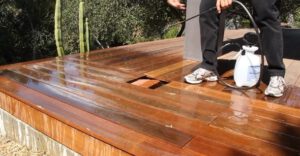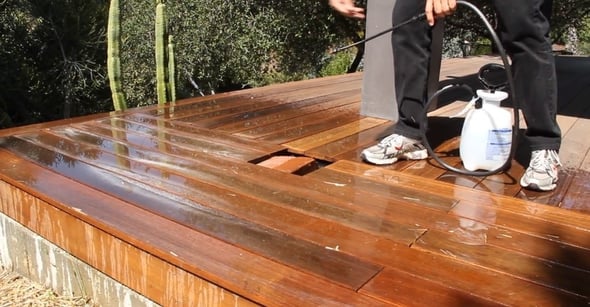Cleaning a deck requires a few different types of products. In this article, we will discuss a few different options for deck cleaning solutions, including Oxygen bleach, vinegar, and Ammonia-free dish soap. These products are made with natural ingredients and can be easily found at your local grocery store or at Pro Deck Builders Charleston.
While it may be tempting to use bleach or ammonia-based cleaners on your deck, these solutions can cause toxic fumes and should not be mixed with other chemicals. They should also be kept out of the reach of small children and should be used with protective gear. Ammonia-free dish soap is the best option for cleaning decks.
For a mild cleaning solution, you can try ammonia-free dish soap and 3.8 liters of water. It’s safe for wood, but you shouldn’t mix it with regular bleach if you’re worried about the chemicals. To be safe, use a mild bleach solution on a small, inconspicuous area first.
Another option is to use a homemade deck cleaning solution. It’s inexpensive and doesn’t require a pressure washer or sprayer. To apply, simply mix a small amount of soapy dish soap with water and apply it to your deck. Leave it on for a few minutes, and then rinse it off. This will help get rid of any algae or mildew that might have built up on your deck.
One of the best homemade deck cleaning solutions is an ammonia-free solution that will remove oily stains and grime without damaging the wood’s finish. The solution contains oxygen bleach and will clean any deck without stains. The solution foams when applied, and it will restore the natural color of the wood.
For a more powerful cleaning solution, you can use a mixture of oxygen bleach and water. Make sure to wear protective gear and mix thoroughly. Then, you can use a scrub brush to scrub away stubborn grime and dirt.
Oxygen bleach is a cleaning product that’s safe for decks and wood. This concentrated chemical can be mixed with water to make a solution that can be used for a variety of household tasks. After mixing the solution, it’s important to allow it to sit for 30 minutes. Then, use a scrub brush to scrub the surface. Rinse with clean water to remove any residue. Oxygen bleach can also be used to remove mold, mildew, and stains. A solution of one tablespoon of oxygen bleach in eight liters of water will clean a 20-square-foot deck or porch.
When using oxygen bleach for deck cleaning, be sure to follow manufacturer instructions closely. You don’t want oxygen bleach to cause damage to your deck’s wood, so make sure you know what you’re doing. You don’t want oxygen bleach to harm your plants, so be sure to read the label carefully to avoid damage. You’ll want to wait about 20 minutes after applying the oxygen bleach solution before using your pressure washer or garden hose to rinse the deck.
Oxygen bleach is a powder that contains an oxygen-based acid that’s effective against mold, mildew, and stains. It also brightens wood and refreshes it. But be careful: oxalic acid is toxic. Alternatively, you can use citric acid.
Oxygen bleach for deck cleaning is safer than chlorine bleach because it won’t damage the wood. It will also not bleach metal fasteners as chlorine bleach does. However, oxygen bleach requires more work and time to use than chlorine bleach. To use oxygen bleach on a wood deck, you’ll need to mix it with water and allow it to sit for about fifteen minutes before rinsing it.
You can clean your deck with a simple solution of vinegar and baking soda. Mix half a cup of white vinegar with 1/4 cup of baking soda in one gallon of water. Then, brush the solution on the affected areas. Rinse with water. Repeat as needed until the deck is clean and clear.
Vinegar is an effective cleaning solution that is non-toxic and readily available. It can be used to remove dirt, mildew, and mold from wooden decking. In addition, it will not damage the wood or composite decking. It will also not harm plants, unlike commercial cleaning products, which may harm the plants on contact. A greener alternative is to use a natural, biodegradable cleaner.

